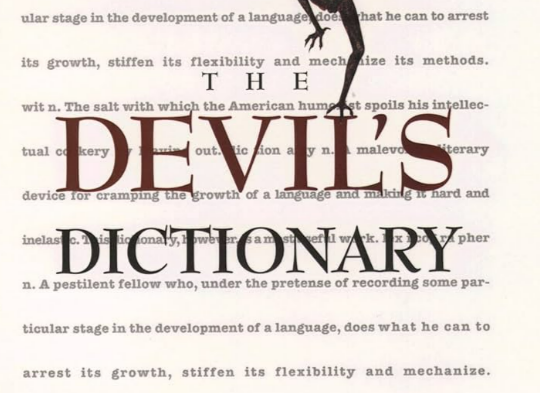The Devil’s Dictionary
Chapter A
byChapter A unfolds with Bierce’s familiar edge, starting with Abasement, which he defines not as humility, but as calculated submission—particularly in contexts of employment or authority. Rather than depicting it as a virtue, he recasts it as a social strategy, where people learn to shrink themselves in order to survive power dynamics. The sharpness of the definition cuts through the illusion of dignity in hierarchy. For Bierce, the act of lowering oneself is not noble, but necessary in systems built on dominance. This perspective sets the tone for the rest of the chapter: a lexicon where virtue and vice often switch roles.
Abdication is treated not as a failure, but as a moment of clarity—when a monarch realizes the absurd weight of their supposed power. Bierce captures this with verse, using wit to show how stepping down may be the only wise act in a ruler’s career. The imagery suggests that even thrones can feel like traps. Power, instead of being liberating, becomes burdensome and absurd. He reminds us that control often brings discomfort, not prestige, and stepping away is less cowardice than sanity. Abdomen, by contrast, dives into physicality with humor. Men are shown to glorify their bellies while women are shamed for theirs, a commentary on gendered double standards.
Continuing with Absent, Bierce satirizes how presence—or its lack—defines a woman’s value in society. In a few words, he critiques both objectification and dependence, challenging the notion that identity must be affirmed by others’ acknowledgment. Absolute, when applied to monarchy, exposes the illusion of omnipotence. The ruler’s word may be law, but Bierce suggests that the law is often wielded in ignorance or cruelty. Power isn’t questioned because it’s strong—but because no one dares to question it. He subtly points to how fear masquerades as loyalty in political systems.
Abstainer draws attention to how virtue can be worn like a badge. Bierce describes such individuals not as disciplined but as those who refrain from vice only to boast of it. The irony lies in the fact that the abstainer’s restraint is less about control and more about performance. With Advice, the cynicism deepens—Bierce likens it to something freely given but rarely taken, revealing how often people offer counsel not to help, but to assert control. He implies that advice is more about the speaker than the listener, a currency traded for influence rather than care. This entry questions the sincerity behind words that are meant to guide but often serve to dominate.
Affliction is treated not as suffering, but as the world’s natural response to humanity. Rather than viewing pain as misfortune, Bierce suggests it is the most predictable part of living. With this, he shifts perspective from personal tragedy to universal condition, hinting that suffering is less about failure and more about design. Alliance, often praised in politics and diplomacy, is recast as a temporary truce made for mutual benefit, usually discarded when inconvenient. Bierce critiques how loyalty in alliances is shallow, forged by convenience rather than principle. History is full of such shifts—alliances broken not by betrayal, but by strategy.
Ambition is dissected with surgical precision. For Bierce, it is the desire to climb not for vision or progress, but for vanity. The higher one climbs, the less one sees of others—because ambition, in his view, narrows perspective. Ancestor is reimagined not as a noble lineage, but as a stranger from whom people steal prestige. Bierce’s sarcasm points to how heritage is often invoked not to honor the past, but to borrow authority. It’s not about remembering, but leveraging. Ancestry becomes less about connection and more about convenience.
In Auctioneer, Bierce captures the fusion of salesmanship and spectacle. The auctioneer doesn’t just sell goods—he performs urgency, manipulating the crowd to inflate value. It’s capitalism wrapped in charisma, and Bierce points to how easily people are drawn into the illusion of scarcity. This manipulation mirrors other forms of persuasion throughout society—political speeches, moral lectures, or legal promises—all designed to sway, not inform. The auction becomes a metaphor for society’s broader marketplace of influence, where everything, including attention and belief, is up for sale.
By the end of the chapter, Bierce has stripped away the presumed dignity of several familiar terms. Each entry is a miniature reflection on how language can both reveal and obscure. His satire invites readers to think critically—not only about definitions, but about the intentions behind them. With sharp prose and biting humor, he exposes how words serve power, ego, and tradition more than truth. What begins as a simple dictionary transforms into a literary scalpel, cutting through centuries of cultural pretense. Bierce does not seek to destroy meaning, but to reclaim it—from those who’ve used it to deceive.


0 Comments